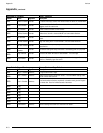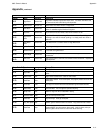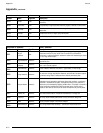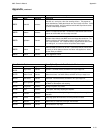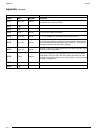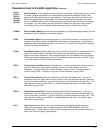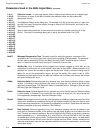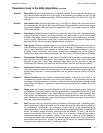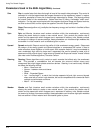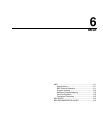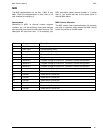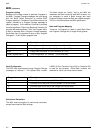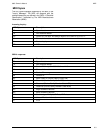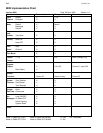
Using The Reverb Program Lexicon, Inc.
Parameters Used in the 960L Algorithms, Continued
5-14
Size
Slope
Spin
Spread
Steering
Wander
Size is a scale factor that alters the length of most of the reverb’s delay elements. This control is
calibrated in units that approximate the longest dimension of the reverberant "space" in meters.
In practice, perception of room size is also strongly determined by Shape. Size strongly affects
the overall timbre of the reverberation. Values less than 25 have a noticeable "small room"
coloration. For the most neutral sound with the programs that have Shape and Spread controls,
set Size to about 30M, and the adjust the apparent size with Shape and Spread.
Slope (Reverse algorithm only) multiplies low-frequency energy and is similar in its effect to Bass
Multiply.
Spin and Wander introduce small random variations within the reverberation, continuously
altering the reverb timbre to create a more natural sound. Spin controls the relative rate of
motion and the speed with which changes occur, expressed in arbitrary units. Wander controls
the amount of change. At extreme settings, these parameters can introduce slight wobbles that
are audible in critical material such as classical guitar or piano.
Spread works with Shape to control the profile of initial reverberant-energy growth. Shape sets
the contour of the energy growth and Spread stretches or compresses this contour in time to
make reflections closer together or further apart. With complex material, it may be advisable to
use a moderately high value for shape and a moderately low one for spread to create a bit of
space around the original signal. Large values of Spread and Shape can create "inverse" effects
(see note under Reverse algorithm). See also Contour.
Steering (Stereo algorithms only) controls a matrix encoder that affects only the reverberant
tails. This provides a reverberation that will decode into surround without strong early
components that might trigger phase correction devices. Steering is not continuously variable,
but offers the following choices:
• Mono -- Mono sum tail.
• Narrow -- between mono and stereo.
• Stereo
• Wide -- Expanded Stereo.
• Lex -- LexiconLogic™, a matrix that includes separate left and right surround signals
when used with a Lexicon Logic decoder, but is also compatible other commercial matrix
codings and with stereo and mono.
• Matrix -- 4-2-4 encoding.
Wander and Spin introduce small random variations within the reverberation, continuously
altering the reverb timbre to create a more natural sound. Spin controls the relative rate of
motion and the speed with which changes occur, expressed in arbitrary units. Wander controls
the amount of change. At extreme settings, these parameters can introduce slight pitch wobbles
that are audible in critical material such as classical guitar or piano.



